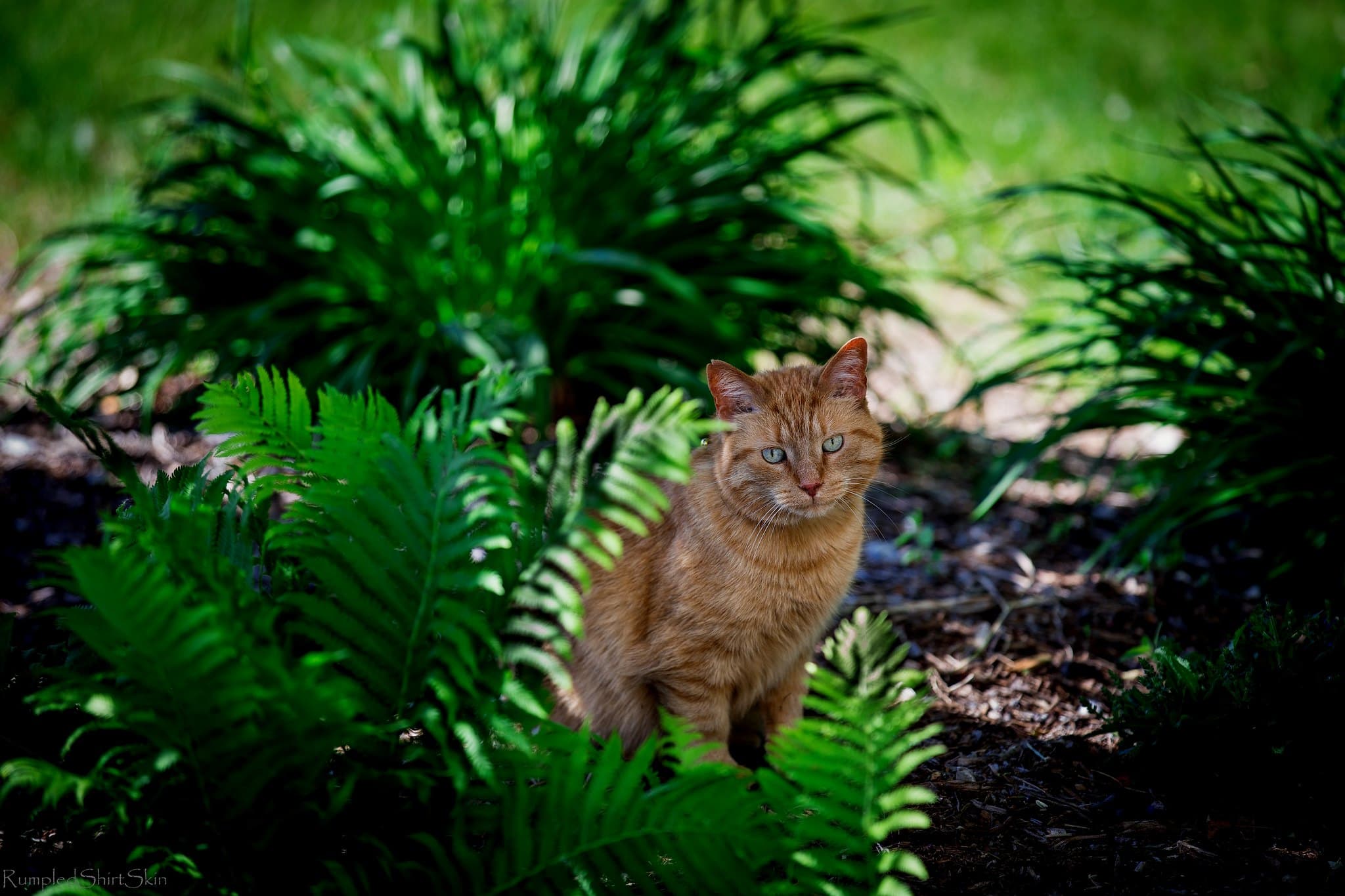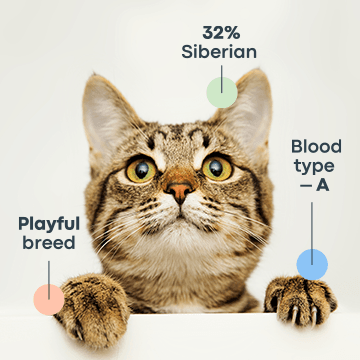Cats are naturally curious and love to explore—and sometimes that includes nibbling on plants. If a plant catches their eye, they might just decide it looks like a tasty snack. Depending on the plant, this can lead to anything from a mild upset tummy to something more serious. If you’re a cat and plant lover, you’ve probably wondered if ferns are toxic to cats. And what should you do if your furry friend takes a bite? Don’t worry—this guide breaks it all down to help keep your cat safe and your mind at ease.
Are Ferns Poisonous to Cats?
In a nutshell, most ferns are not poisonous to cats. However, some ferns may be confused with their look-alike cousins. This muddies the waters quite a bit. There is a difference between what is classified as “true ferns” and those plants with a fern-like appearance but not part of the fern family. Unfortunately, some of these faux ferns are dangerous to cats.
So, are ferns bad for cats? Are they harmful or even dangerous for your pet? A little knowledge goes a long way. Let’s explore the various types of ferns and faux ferns and learn what to do if your cat eats or bites your fern.

What type of plant are ferns?
Ferns are not flowering plants and do not have blooms or seeds. Most ferns reproduce via spore production. But ferns have leaves, roots, and stems as part of their anatomy, just as flowering plants do.
Are there ferns cats can consume safely? No. Many plants that look like ferns or have the word "fern" in their name are not actually ferns at all. Many are toxic for your cat. Among the most common of these are Asparagus fern, Sprengeri fern, fern palm, and winter fern. Contact the Pet Poison Helpline or your veterinarian if your cat eats any of these plants.
True Ferns: Are They Safe For Cats?
According to the ASPCA, plants that are considered true ferns are generally safe to keep in a home with cats. True ferns include the Boston, button, rabbit's foot, and staghorn varieties. This doesn't mean it is safe for your cat to eat them. These plants are not dangerous and will not cause severe damage if your pet ingests them.
Are ferns safe for cats? In general, yes. If your cat eats one of these types of ferns, your kitty might have an upset tummy with mild diarrhea and vomiting. These symptoms usually do not require medical intervention. Still, checking in with your vet for guidance is always a good idea.
Fern Toxicity and Cats
Cats are curious creatures that are always willing to try new snack foods. To keep your fur baby safe, remove any hazards from their reach. Ferns can be dangerous to cats. A pet parent has to do their best to avoid poisonous hazards. Cats and ferns are not the best combination. Even if it’s not a deadly one! Know what to do if your pet ingests a fern. This might very well happen contrary to your best efforts to keep the feline safe. At the end of the day, it may not be possible to watch the felines every second of the day. Certain plants can adversely affect felines even by being in the general vicinity. Pollen from certain plants is toxic to kitties if inhaled.
Are Boston Ferns Toxic to Cats?
Boston ferns are not a threat to cats. For any pet-friendly home, these are a great addition. These lush, delicate plants aren’t harmful if a curious cat decides to take a nibble. A Boston fern in one household became a favorite napping spot for a particularly adventurous tabby, who loved hiding beneath its fronds. While it’s non-toxic, keeping the plant elevated can protect it from overzealous pawing. Regular care, like misting, keeps the fern vibrant and prevents your cat from turning it into a chew toy. For households with cats, Boston ferns bring greenery without compromising safety.

Is the Foxtail Fern Toxic to Cats?
Yes. Expect serious health issues if your feline ingested this fern. Their sharp leaves and berries can irritate a cat’s mouth and digestive system. A curious kitten once chewed on a foxtail fern, leading to a rushed vet visit due to vomiting and drooling. To avoid such risks, it’s best to keep this plant far from reach or opt for a non-toxic alternative. Cats are natural explorers, so replacing risky plants with safer ones ensures peace of mind. If a cat shows unusual symptoms, contacting a vet promptly is essential.
Are Button Ferns Toxic to Cats?
Button ferns are completely safe for cats. It makes them an ideal choice for cat owners. These compact, charming plants can coexist peacefully with curious felines. In one home, a mischievous cat loved batting at the fern’s small, round leaves without any harm. While button ferns are non-toxic, placing them in a spot that’s slightly out of reach can help keep the plant intact. Button ferns thrive in moderate light and only need occasional watering, making them easy to care for. Their resilience and safety make them a favorite for households with cats who love to explore. They’re a low-maintenance option that allows for greenery in the home without the worry of accidental poisoning, even for the most playful or plant-loving cats.
Symptoms of Fern Poisoning in Cats
These can range from mild to severe if your cat ingests parts of the leaves or the oil from toxic ferns. The ASPCA lists many of the plants to be avoided on their webpage. Here are some symptoms to watch out for if your pet has made a meal of your ferns.
Diarrhea
Stomach Pain
Drooling
Vomiting
Serious health issues could result if your pet bit or rubbed against a toxic variety of ferns. Consult with your veterinarian to discuss the proper plan of care. Most likely this will involve an in-person assessment of your cat.
Treatment and Recovery
Alert your vet as soon as possible and follow their directives. Eating or even simply rubbing up against a fern can be a cause of severe medical woes for your kitty. If your vet wants to assess your cat in the office, bring a piece of the fern the animal ingested or touched for analysis. This is exceedingly helpful for diagnostic and treatment purposes.
In most cases, the veterinarian will rinse the irritating oils from the fern from your cat’s mouth and skin. The veterinarian might order intravenous fluids to keep your fur baby hydrated. This is when your kitty is vomiting and having diarrhea. An antihistamine might be administered to address any skin irritation.
Other Poisonous Plants To Keep My Cat Away From
A variety of common houseplants could prove dangerous to your feline friend if ingested. Here are a few plants that can harm your pet. If you are unsure of what to do after your cat has eaten one of your plants, call ASPCA Animal Poison Control Center at (888) 426-4435 for guidance.
Pothos Plants
Pothos plants are harmful to felines. If your cat ingests this plant, it could irritate your pet’s tongue, lips, or mouth. Ingestion of a pathos plant can also cause excessive salivation, trouble swallowing, or vomiting.
Tulips
Tulips belong to the Lily family. All parts of the tulip, especially the bulb, are toxic to cats. Tulips contain alkaloid and glycoside compounds and allergenic lactones, which are toxic. Ingestion may cause vomiting, drooling, and diarrhea.
Aloe Vera Plant
The Aloe Vera plant is a commonplace succulent healing for humans but toxic to cats. A substance called Aloin is Aloe Vera’s toxic agent that can be harmful to your pet. This yellow and bitter substance in most Aloe Vera plants can cause your cat G.I. upset and vomit and may also turn your pet’s urine reddish.
Peace Lily Plant
Munching on a Peace lily can result in a burning sensation on the tongue and lips. Common symptoms of Peace lily toxicity include drooling, difficulty swallowing and vomiting. Kidney failure or even death can happen in rare events if your pet is left untreated.
Mother-in-Law Plant (Monstera Deliciosa)
More commonly known as the snake plant, it contains a toxic to cats substance called saponin. This toxin can result in G.I. distress, drooling, and swelling of the animal’s mouth and throat.
Conclusion
Keep toxic fern-like plants out of your house and yard if it is possible. If you do have these plants in your indoor or outdoor garden, place any toxic plants as far out of the cat's reach as possible. Keep a first aid kit on hand, as well as emergency phone numbers such as those for a pet poison hotline and your vet's emergency contact number.
Even if you remove all the plants from your house, your cat could nibble on a fern if they got out. It's a good idea to be prepared for a poisoning emergency, even if it's not likely to happen. Better safe than sorry!
Frequently Asked Questions
Are ferns toxic to cats?
Depending on the plant they can be. A cat ingesting a fern can cause mild and transient discomfort to a full-blown emergency. Most ferns are not toxic to cats. Some have look-alike cousins that can cause severe consequences when ingested by a feline.
Can cats eat ferns?
According to the ASPCA, plants that are considered true ferns are generally safe to keep in a home with cats. These are the Boston, button, rabbit's foot, and staghorn varieties. You should still discourage your cat from eating them. These plants are not dangerous but not healthy either.
What ferns are safe for cats?
Boston, button, rabbit's foot, and staghorn varieties.
What ferns are poisonous to cats?
Ferns like the asparagus fern, foxtail fern, and lace fern. The feline might experience vomiting, diarrhea, or irritation. It’s best to keep these plants out of reach or avoid them altogether in homes with cats.





